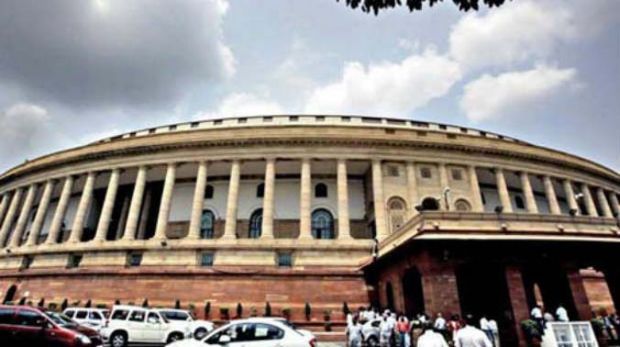NEW DELHI: After the truce in Parliament, the Modi government is hopeful about a substantial portion of pending legislative business being completed in the remaining three days of the Winter Session beginning Monday.
After disruptions in both Houses, particularly the Rajya Sabha, over the last three weeks, The government and opposition arrived at an agreement yesterday at an all-party meeting called by Rajya Sabha Chairman Hamid Ansari to pass those bills on which there is a general consensus, skipping the contentious GST bill.
In the Upper House, where the Winter Session has been a near washout so far, 18 bills are pending. No new bill could be introduced in Rajya Sabha during the session, while the only one that was passed was the The Negotiable Instruments (Amendment) Bill, which deals with cheque bounce cases.
Legislative and financial items entailing 43-and-a-half- hours of business are pending before the House, including key bills like The Scheduled Castes and the Scheduled Tribes (Prevention of Atrocities) Amendment Bill, The Real Estate (Regulation and Development) Bill and The Whistle Blowers Protection (Amendment) Bill are to be taken up.
There is a broad political consensus to pass the the SC/ST bill, which is a politically-sensitive issue.
Apart from it there is also a general consensus to pass the Appropriation Bills, the Anti-Hijacking Bill, the Atomic Energy (Amendment) Bill, the Commercial Courts Ordinance Bill and the Arbitration and Conciliation (Amendment) Bill.
The SC/ST Amendment Bill, which was moved in the House on December 14, has already been listed for discussion on Monday. The government has also listed two appropriation bills the same day.
Two other bills — The Arbitration and Conciliation (Amendment) Bill and The Commercial Courts, Commercial Division and Commercial Appellate Division of High Courts Bill have also been listed for Monday.
The major bills like The Whistle Blowers Bill, The Atomic Energy (Amendment) Bill and the The Anti-Hijacking Bill have been listed for Tuesday.
At the all-party meeting, it was decided that three bills – the Child Labour (Prohibition and Regulation) Amendment Bill, the Whistle Blowers Protection (Amendment) Bill and the Juvenile Justice (Care and Protection of Children) Bill – will be discussed during the remaining period but the course of action will be decided later.
The opposition is insisting on sending the Whistle Blowers Bill to a Select Committee.
Rajya Sabha is also likely to take up discussion on the issue prices of essential commodities and foodgrains in the country and “growing intolerance endangering the unity and diversity of the country”. Ever since the Winter Session got underway on November 26, proceedings in the Upper House were disrupted over a variety of issues, with Congress accusing the Modi government of “political vendetta” in the wake of the National Herald case. The Arunachal Pradesh imbroglio and Union Minister V K Singh’s ‘dog’ remarks also triggered uproar in the House.
In Lok Sabha, Finance Minister Arun Jaitley will on Monday introduce The Insolvency and Bankruptcy Code, 2015 that seeks to consolidate and amend the laws relating to reorganisation and insolvency resolution of corporate persons, partnership firms and individuals in a time-bound manner for maximisation of value of assets.
Union Minister Nitin Gadkari will move the National Waterways Bill, which seeks to make provisions for existing national waterways and to provide for the declaration of certain inland waterways as national waterways and also to provide for regulation and development of waterways.
On Tuesday, Labour Minister Bandaru Dattatreya will move The Payment of Bonus (Amendment) Bill that seeks to amend the Payment of Bonus Act, 1965.
Lok Sabha is likely to take up discussions on the situation in Nepal and Indo-Nepal relations, besides Sustainable Development Goals.
Lok Sabha has allotted three hours and two hours each to discuss and pass The National Waterways (Amendment) Bill and The Payment of Bonus (Amendment) Bill respectively. (PTI)


